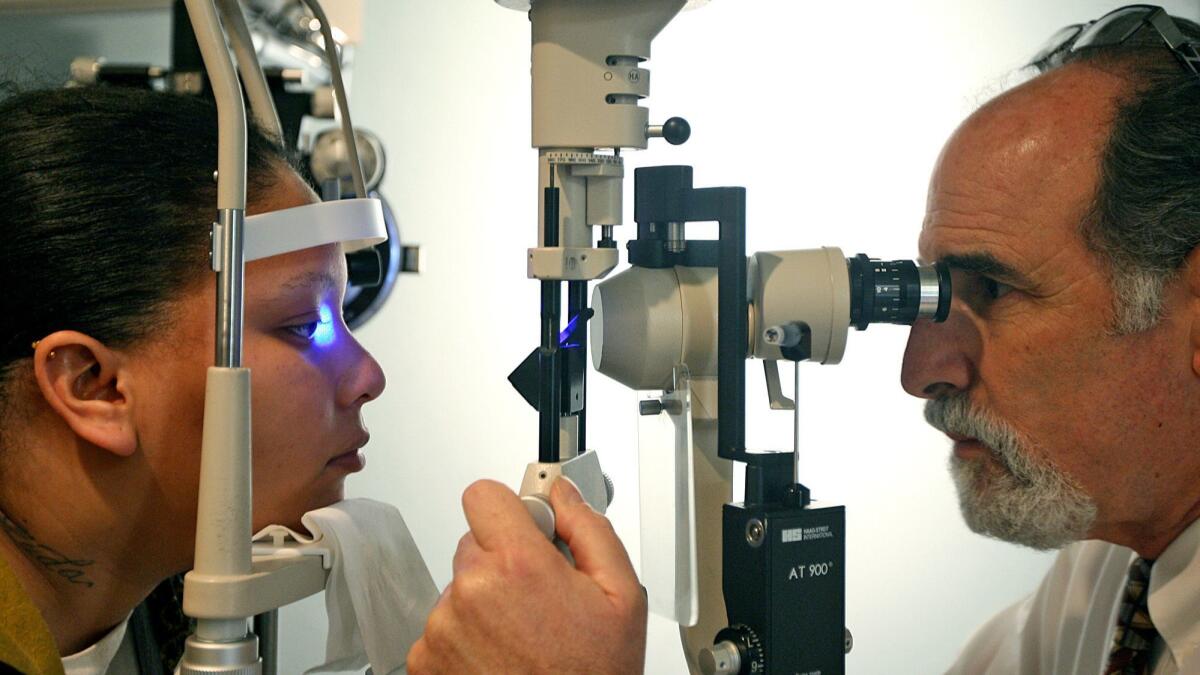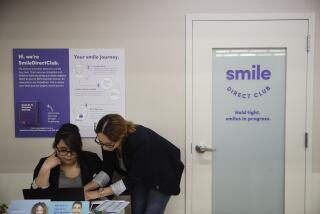Column: Coronavirus could accelerate moves toward ‘telemedicine’

- Share via
Dr. Robert Shapiro, a downtown Los Angeles optometrist and past president of the L.A. County Optometric Assn., knows his business may be riskier than some others amid the coronavirus pandemic.
His patients have to make direct contact with exam equipment — the phoropter that fits over your face and tests different lens strengths, the autorefractor and retinal camera that require people to rest their chin in a small cup.
Then there are the frame fittings and adjustments that require an optician to stand inches from your face and, typically, make contact with your head.
“There’s obviously a risk,” Shaprio acknowledged. “But what choice do we have? The only option would be not to open our doors.”
Yet as brick-and-mortar optometrists — and many other businesses — grapple with life amid a public-health crisis, the coronavirus outbreak represents an opportunity for a new wave of upstart glasses companies that operate solely online.
It’s just one example of how the pandemic could accelerate moves toward so-called telemedicine, by which patients are treated by doctors and nurses remotely.
“It is a no-brainer,” said Rashid Bashshur, executive director of eHealth for the University of Michigan Health System. “Most routine medical visits don’t have to be conducted in person.”
Other experts agreed.
“For chronically ill, vulnerable patients, getting their status checked remotely will reduce exposure to possibly infected patients on the way to the office or in the waiting room,” said Jack Needleman, a professor of health policy and management at UCLA.
To date, most movement on the telemedicine front has involved bringing remote care to rural areas, typically by telephone or video conferencing.
The next phase will be more focused on treating people at home regardless of where they live, using broadband internet access and online diagnostic tests to diagnose and treat problems.
Online glasses companies provide an example of how some entrepreneurial businesses are embracing technology to transform patient and consumer experiences.
They’ve already mitigated some of the risk of buying glasses via the internet with “virtual try-on” tools and apps that allow you to see how you’d look in frames without actually putting them on.
The next big advance will be online eye exams — an innovation that, according to some industry players, could be just around the corner.
Darren Rosenberg, chief executive of L.A.-based Lens & Frame Co., told me he’s in talks with an Israeli company that believes it’s close to a workable digital eye exam that could eliminate the need to see an optometrist.
“They say they’re six months to a year away,” Rosenberg said.
This seems highly optimistic, considering any such test would need approval from the Food and Drug Administration before being offered to consumers.
“I tend to agree,” Rosenberg admitted.
On the other hand, it’s entirely possible that regulatory agencies worldwide will hit the gas pedal when it comes to telemedicine ventures, overcoming resistance from office- and hospital-based practitioners who see remote care as a threat to their livelihoods.
“We see it speeding up,” Sean Pate, a spokesman for Zenni Optical, one of the largest online glasses stores, said of digital eye exams.
“The tools are effectively built already,” he observed. “Now it’s mostly a matter of getting them approved.”
That could be easier said than done. Trade groups representing brick-and-mortar optometrists have staunchly opposed any move toward online eye exams, which could have a devastating effect on their industry.
Last year, a Chicago company called Visibly stopped offering the first widely available online eye exam after fierce lobbying by the American Optometric Assn.
The FDA had warned Visibly that it lacked the needed regulatory blessing for its approximately $50 test, which involved the company’s ophthalmologists reviewing online exam results and then issuing a prescription.
“Optometrists and other physicians know that eye exams are essential care and that new health technologies must always enhance the doctor-patient relationship and help deliver improved outcomes,” said Barbara L. Horn, president of the American Optometric Assn.
“They must also comply with the law — that’s exactly what the AOA and our state associations have insisted on through the information we provided to the FDA and other agencies in this matter,” she said.
Zenni’s Pate said this was taken by the online glasses industry as a clear message from both the FDA and brick-and-mortar rivals that the time wasn’t yet right for online exams.
The coronavirus could change that.
“The big online providers are going to be a major resource for people” as the virus spreads, Pate said, adding that Zenni is already hard at work on its own digital exam.
Meanwhile, the coronavirus exposed a weakness of the online glasses business. Most of the cut-rate frames and lenses offered by these companies are manufactured abroad, primarily in China.
Many Chinese factories were forced to shut down temporarily as the coronavirus spread throughout the country.
“We came to a screeching halt right after the Chinese New Year” in January, Pate said. “We were backed up for about two weeks.”
He said Zenni’s Chinese factories are now once again operating at full capacity.
All the online glasses companies I spoke with said they don’t want to be seen as opportunistically exploiting a global health crisis.
But they recognize that great upheaval often brings about great change, and online glasses sales could be at a turning point as consumers increasingly give it a try — just as they did years ago with their first online clothing purchase.
“People aren’t going to malls anymore,” said Andy Bilinsky, chief executive of L.A.-based Lensabl, which hopes to next month add contact lenses to its online frame and lens offerings.
“We’re finding them where they’re going now — Facebook, Instagram,” he said.
Bilinsky observed that home try-ons such as the service offered by Warby Parker, as well as virtual try-ons that are now a mainstay of nearly all online glasses stores, have overcome the initial hesitation many consumers might have about buying glasses over the internet.
People also are gradually becoming more adept at adjusting frames on their own, he said. There are plenty of videos online that show how it’s done.
Internet eye exams, Bilinsky said, will be the next big hurdle to overcome.
“Everybody believes it’s inevitable,” he said. “Whether that’s six months from now or six years from now, nobody knows.”
Many experts also see the broader shift to telemedicine as inevitable.
“The worst place you can be when you are sick is the doctor’s waiting room,” said P. Greg Gulick, an adjunct law professor at Michigan State University who focuses on healthcare.
“Telemedicine also allows for the triage of resources — patients who can remain home can still get a doctor’s advice, and patients who need to be seen in an office or hospital setting can be seen more immediately.”
In the meantime, old-school optometrists such as Shapiro will do whatever’s necessary to adapt to changing (and challenging) times.
He said he’s stocked his shop with plenty of hand sanitizer, and is being even more diligent than usual in wiping down equipment with alcohol.
“You do what you have to,” Shapiro said.
More to Read
Inside the business of entertainment
The Wide Shot brings you news, analysis and insights on everything from streaming wars to production — and what it all means for the future.
You may occasionally receive promotional content from the Los Angeles Times.











